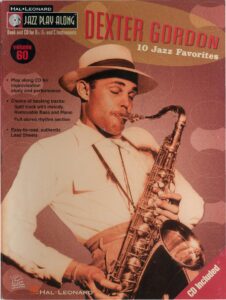Dexter Gordon (sheet music Jazz transcriptions)

Dexter Gordon
Please, subscribe to our Library. Thank you!
Born in Los Angeles, one of the best tenor saxophonists in bebop and hardbop, young Dexter Gordon, learned music theory and clarinet, before choosing alto sax at fifteen and finally tenor two years later.
His career began with the Lionel Hampton Orchestra, with which he stayed for three years. After performing for six months with the Louis Armstrong orchestra (1944), he was hired by Billy Eckstine for a period of one and a half years.
Back in Los Angeles, he participated in a sextet alongside Charlie Parker and Miles Davis, to subsequently create his first quartet, with which he developed an intense activity between Los Angeles and New York.
During this time he recorded with Dizzy Gillespie, Fats Navarro, Charlie Parker, JJ Johnson and Tadd Dameron, before associating with Wardell Gray, with whom he starred in interesting duels between 1947 and 1952 and from which the album “The Chase” (1947) was born.
After spending a few years in prison (1953-1955) for a drug affair, he recorded three albums, “Daddy Plays The Horn”, “Stanley The Steamer” and “Dexter Plays Hot and Cool”, which was followed by a period of oblivion to return in 1960 when he wrote the music for the play, later made into a film, “The Connection” and recorded the album “The Resurgence of Dexter Gordon”.
He then signed a contract with Blue Note that would yield seven excellent albums, including “Doin’ Allright”, “Dexter Calling” (both 1961), “Go” and “A Swingin’ Affair” (both 1962) and about Everything, “Our Man In Paris” in 1963.
Labor difficulties prevented him from developing all his expressive talent. His invitation to perform at Ronnie Scott’s in London was providential, which meant the beginning of a long European exile.
Starting in 1962, he settled in Denmark, where he was treated with respect and affection, recording many albums for the SteepleChase label with musicians who live or are passing through Copenhagen, such as Kenny Drew, Horace Parlan or the Spanish pianist Tete Montoliu.
At the same time, he performs at many European festivals (Malmoe, Molde, Sanremo, Berlin, Lugano) and also in small clubs, leaving his masterly mark in Paris through two historic Blue Note albums, the aforementioned, “Our Man in Paris” (1963, with Bud Powell) and “One Flight Up.”
However, he continued to go to New York for short periods of time; in 1976, for example, he was hired by the Village Vanguard, in a comeback that marked the revival of Bebop in the United States.
Best Sheet Music download from our Library.
From then on, his life was divided between the United States and Europe. His stellar participation in one of the masterpieces of jazz and cinema, such as the film directed by the French filmmaker Bertrand Tavernier in 1986 and entitled “Round Midnight”, was the glorious end to a life full of music and sensitivity.
